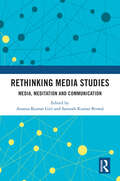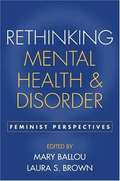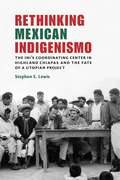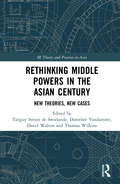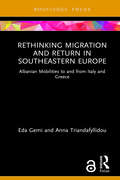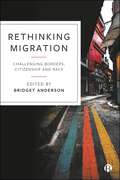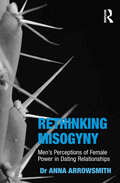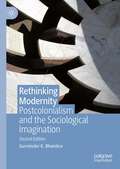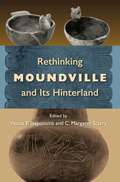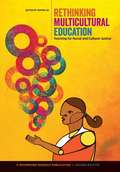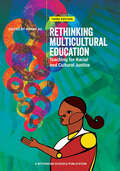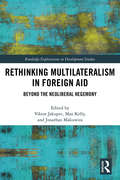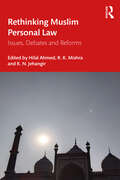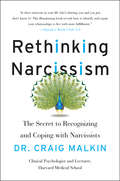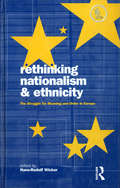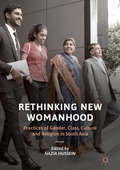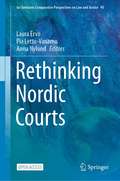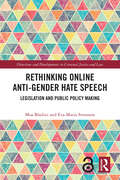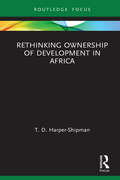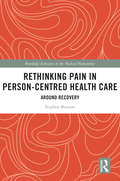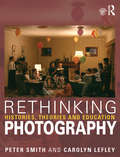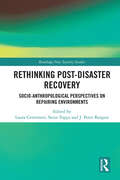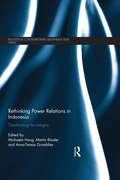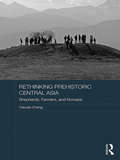- Table View
- List View
Rethinking Media Studies: Media, Meditation and Communication
by Ananta Kumar Giri and Santosh Kumar BiswalThis book reconsiders media studies from different philosophical and theoretical perspectives from around the world. It brings together diverse views and visions from thinkers such as Sr Aubrobindo, Jurgen Habermas, Paul Ricoeur, Pope Francis, and Satyajit Ray, among others. The authors focus on the issues of ethics, aesthetics, meditation, and communication in relation to media studies and explore the links between media and mindfulness. The volume includes case studies from India, United States, Switzerland, and Denmark and presents empirical works on new horizons of critical media studies in different fields such as American news media and creative media lab. A unique contribution, this book will be indispensable for students and researchers of journalism, communication studies, social media, behavioural sciences, sociology, philosophy, cultural studies, and development studies.
Rethinking Medications: Truth, Power, and the Drugs You Take
by Jerry AvornA leading medical expert explains why too many of the medications Americans take are poorly evaluated, overpriced, or pose unwarranted risks—and what we can do to fix that.Groundbreaking research has given us many remarkable new medicines, but America&’s drug evaluation process, once the envy of the world, is being seriously compromised. Under pressure from drugmakers, the FDA has been lowering its approval standards and has let poorly effective or risky products enter the market—while our prescription prices, the highest in the world, put crucial treatments beyond the reach of many. In Rethinking Medications, Dr. Jerry Avorn explains how we got here and what we can do to ensure that our medicines are dependably effective, safe, and affordable. Part of the problem is the power of pharma&’s biggest-in-Washington lobbying clout, which influences members of Congress from both parties. That leverage is extended by the FDA&’s growing dependence on fees the industry pays to get its drugs approved. The increasingly revenue-driven US healthcare system shapes the way doctors prescribe medications—sometimes to the detriment of their clinical decisions. Based on his decades of practice and research at Harvard Medical School and his role at the very center of many of these controversies, Dr. Avorn presents compelling clinical illustrations of these issues across the medical spectrum: from cancer drugs to opioids, from treatments for rare diseases to psychedelics. Throughout, he offers practical steps that consumers, policymakers, and practitioners can take to address these problems—at a moment when our assumptions about scientific evidence, regulation, pricing, and the role of government are being contested as never before.
Rethinking Mental Health And Disorder: Feminist Perspectives
by Laura S. Brown Mary BallouThis volume presents cutting-edge work at the interface of feminist theory and mental health. Building on the success of their acclaimed Personality and Psychopathology, which called into question traditional models of health and disorder, Mary Ballou and Laura S. Brown have invited a stellar array of contributors to continue the vital process of feminist theory building and critique. The book outlines compelling theoretical approaches-including postmodern, constructivist, relational-cultural, and feminist ecological perspectives-that go beyond simply inserting analyses of gender, culture, and other contextual factors into existing paradigms. Also examined are specific areas of distress and disorder about which new feminist understandings have been developed in the past decade. Shedding new light on such conditions as depression, PTSD, psychosis, somatoform disorders, and premenstrual syndrome, chapters address critical questions about how disorders are diagnosed, who gets labeled as "sick," and how treatment is conceptualized and delivered.
Rethinking Mexican Indigenismo: The Ini's Coordinating Center In Highland Chiapas And The Fate Of A Utopian Project
by Stephen E. LewisMexico’s National Indigenist Institute (INI) was at the vanguard of hemispheric indigenismo from 1951 through the mid-1970s, thanks to the innovative development projects that were first introduced at its pilot Tseltal-Tsotsil Coordinating Center in highland Chiapas. <P><P>This book traces how indigenista innovation gave way to stagnation as local opposition, shifting national priorities, and waning financial support took their toll. After 1970 indigenismo may have served the populist aims of president Luis Echeverría, but Mexican anthropologists, indigenistas, and the indigenous themselves increasingly challenged INI theory and practice and rendered them obsolete.
Rethinking Middle Powers in the Asian Century: New Theories, New Cases (IR Theory and Practice in Asia)
by David Walton Tanguy Struye de Swielande Dorothée Vandamme Thomas WilkinsThe term "middle power" is conceptually fragile. Some scholars have even argued for abandoning it. This book argues that the concept needs to be analysed more profoundly and that new analytical tools need to be developed to better understand the phenomenon. The traditional approach, based on Western states, is insufficient and has become increasingly irrelevant in a transformed global environment. Instead of drawing from a single theory of international relations, the contributors have chosen to build upon a wide range of theories in a deliberate demonstration of analytic eclecticism. A pluralistic approach provides stronger explanations while remaining analytically and intellectually rigorous. Many of the theory contributions are reconsidering how the largely "Western" bases of such theorising need revising in light of the "emerging middle powers", many of which are in Asia. Presenting a strong argument for studying middle powers, this book explores both the theory and empirical applications of the concept by rethinking the definition and characteristics of middle powers using a range of case studies. It examines changes in the study of middle powers over the last decade, proposing to look at the concept of middle powers in a coherent and inclusive manner. Finally, it aims to further the discussion on the evolution of the international system and provides sound conclusions about the theoretical usefulness and empirical evolution of middle powers today.
Rethinking Migration and Return in Southeastern Europe: Albanian Mobilities to and from Italy and Greece
by Anna Triandafyllidou Eda GemiThis book provides an important new analytical framework for making sense of return, remigration and circular mobility, conceptualising them as different phases of a wider migration process. Using an in-depth case study of Albania and its two main destination countries, Italy and Greece, the book demonstrates that instead of being viewed as a linear path between origin and destination, migration should be seen as a segmented, or cyclical pattern that may involve several localities and more than two countries. Characterised by important previous historical, social, economic and political linkages, geographical proximity but also high migration volatility and sustained flows in either directions, Albanian migration to Italy and Greece offers an optimal case study for analysing complex return, reintegration and mobility processes. While interesting as a unique regional migration system, the lessons learned cast light on important migration and mobility dynamics that are relevant for labour migration in Europe, also from other important migrant origin countries in the EU’s neighbourhood such as for instance Morocco or the Ukraine. This rich theoretical and empirical study will be of interest to researchers within European Studies and Migration Studies, as well as providing a useful contribution to policy debates on how to govern return migration, reintegration and circular migration.
Rethinking Migration: Challenging Borders, Citizenship and Race
by Bridget AndersonAvailable open access digitally under CC-BY-NC-ND licence. Humans have always moved, but across the world ‘migration’ has become a major policy, political and media concern. How can we understand human movement without positioning ‘the migrant’ as a problem? This interdisciplinary collection rethinks migration and movement. It explores mobility beyond the human and across time, from the movement of soil in the Middle Ages to contemporary cow passports. It also examines the histories of international borders and how they are intertwined with the politics of race and nation. The book illustrates that conceptually based, critical and creative thinking is as important for practice as it is for theory and can help us understand and respond to migration as a force that connects rather than divides.
Rethinking Misogyny: Men's Perceptions of Female Power in Dating Relationships (Sexualities in Society)
by Anna ArrowsmithIn this path-breaking book Anna Arrowsmith analyses gendered dating behaviour and shows how men’s behaviour is both defined and illustrated by societal norms that require a particular masculine performance, including those desired by potential female performers. Using the case-study of pick-up artistry which is compared to interviews with other men who date women, this book analyses how the men deal with conflicting ideas borne out of living in an age when both hegemonic (harder, historic) and inclusive (softer, modern) masculinities co-exist. It asks whether men acknowledge their own insecurities or whether they focus on perceived external triggers, such as female culpability as a means of ignoring their own concerns, or, whether men respond to insecurities by focusing on an active process of overcoming them. Through exploring male experiences of female beauty, emotions, fertility, strength, female violence and sexual assault, Arrowsmith’s findings encourage a new path of enquiry in gender studies which explores and includes men's words as central to interpreting their behaviour and how it is understood. This book has political worth as it differentiates and delineates between emotive and often misogynistic demands for an entire rethink of the gender order by some men's rights activists and a genuine need to incorporate male insecurities and psychological experiences in how we understand gender to be structured and performed, as a means to increase equality.
Rethinking Modernity: Postcolonialism and the Sociological Imagination
by Gurminder K. BhambraThe second edition of this influential book addresses how the experiences and claims of non-European ‘others’ have been rendered invisible to the standard narratives and analytical frameworks of sociological understandings of modernity. In challenging the dominant, Euro-centred accounts of the emergence and development of modernity, Bhambra puts forward an argument for ‘connected histories’ in the reconstruction of historical sociology at a global level. This updated version of the original, published in 2007, adds a new preface which explores key themes that Bhambra has further developed over the intervening years: specifically, how the rethinking of modernity enables us to reconstruct sociology and a call for a 'reparatory sociology' committed to the repair of the social sciences and the securing of global justice.
Rethinking Moundville and Its Hinterland (Florida Museum of Natural History: Ripley P. Bullen Series)
by Vincas P. Steponaitis C. Margaret ScarryMoundville, near Tuscaloosa, Alabama, is one of the largest pre-Columbian mound sites in North America. Comprising twenty-nine earthen mounds that were once platforms for chiefly residences and public buildings, Moundville was a major political and religious center for the people living in its region and for the wider Mississippian world. A much-needed synthesis of the rapidly expanding archaeological work that has taken place in the region over the past two decades, this volume presents the results of multifaceted research and new excavations. Using models deeply rooted in local ethnohistory, it ties Moundville and its people more closely than before to the ethnography of native southerners and emphasizes the role of social memory, iconography, and ritual practices both at the mound center and in the rural hinterland, providing an up-to-date and refreshingly nuanced interpretation of Mississippian culture. A volume in the Florida Museum of Natural History: Ripley P. Bullen Series
Rethinking Multicultural Education: Teaching for Racial and Cultural Justice
by Wayne Au<P>All writing is a collective process, and none more so than with Rethinking Schools. <P>This book would have not been possible without the collective efforts of many people.
Rethinking Multicultural Education: Teaching for Racial and Cultural Justice
by Wayne AuFrom book bans, to teacher firings, to racist content standards, the politics of teaching race and culture in schools have shifted dramatically in recent years. This 3rd edition of Rethinking Multicultural Education has been greatly revised and expanded to reflect these changing times, including sections on “Intersectional Identities,” “Anti-Racist Teaching Across the Curriculum,” “Teaching for Black Lives,” and “K-12 Ethnic Studies,” among others. Practical, rich in story, and analytically sharp, Rethinking Multicultural Education can help current and future educators as they seek to bring racial and cultural justice into their own classrooms.
Rethinking Multilateralism in Foreign Aid: Beyond the Neoliberal Hegemony (Routledge Explorations in Development Studies)
by Viktor Jakupec Max Kelly Jonathan MakuwiraThis edited book provides a contemporary, critical and thought-provoking analysis of the internal and external threats to Western multilateral development finance in the twenty-first century. It draws on the expertise of scholars with a range of backgrounds providing a critical exploration of the neoliberal multilateral development aid. The contributions focus on how Western institutions have historically dominated development aid, and juxtapose this hegemony with the recent challenges from right-wing populist and the Beijing Consensus ideologies and practices. This book argues that the rise of right-wing populism has brought internal challenges to traditional powers within the multilateral development system. External challenges arise from the influence of China and regional development banks by providing alternatives to established Western dominated aid sources and architecture. From this vantagepoint, Rethinking Multilateralism in Foreign Aid puts forward new ideas for addressing the current global social, political and economic challenges concerning multilateral development aid. This book will be of interest to researchers, academics and students in the field of International Development and Global Governance, decision-makers at government level as well as to those working in international aid institutions, regional and bilateral aid agencies, and non-governmental organisations.
Rethinking Muslim Personal Law: Issues, Debates and Reforms
by R. K. Mishra K. N. Jehangir Hilal AhmedThis volume critically analyses Muslim Personal Law (MPL) in India and offers an alternative perspective to look at MPL and the Uniform Civil Code (UCC) debate. Tracing the historical origins of this legal mechanism and its subsequent political manifestations, it highlights the complex nature of MPL as a sociological phenomenon, driven by context-specific social norms and cultural values. With expert contributions, it discusses wide-ranging themes and issues including MPL reforms and human rights; decoding of UCC in India; the contentious Triple Talaq bill and MPL; the Shah Bano case; Sharia (Islamic jurisprudence) in postcolonial India; women’s equality and family laws; and MPL in the media discourse in India. The volume highlights that although MPL is inextricably linked to Sharia, it does not necessarily determine the everyday customs and local practices of Muslim communities in India This topical book will greatly interest scholars and researchers of law and jurisprudence, political studies, Islamic studies, Muslim Personal Law, history, multiculturalism, South Asian studies, sociology of religion, sociology of law and family law. It will also be useful to practitioners, policymakers, law professionals and journalists.
Rethinking Narcissism: The Bad---and Surprising Good---About Feeling Special
by Craig MalkinAre you a narcissist?"What is narcissism?" is one of the fastest-rising searches on Google, and articles on the topic routinely go viral. Yet the word "narcissism" seems to mean something different each time it's uttered. <P><P>In fact, the more it's slung about, the more elusive its true meaning becomes. The only certainty, it would seem, is that it's "bad" to be a narcissist--really bad. That's terrible news for millennials, who've been branded "the most narcissistic generation ever." <P>In Rethinking Narcissism, Dr. Craig Malkin--a Harvard Medical School Instructor and clinical psychologist with more than two decades of clinical experience--offers a radically new model for understanding this often misused term. <P>Narcissism, argues Dr. Malkin, is essentially a spectrum of self-importance--and everyone falls somewhere on the scale between utter selflessness and total arrogance. When we casually invoke the term "narcissist," most of us are referring to the outer edge of the spectrum, which can shade into dangerous psychopathy. <P>But there are also those who live at the lower end of the spectrum--dubbed "echoists" by Dr. Malkin. These, too, are people we know; people so fearful of attention or acknowledgment that they often seem to have no voice at all.Drawing on his own research as well as on the latest findings in psychology, Dr. Malkin uses vivid stories of people from all walks of life to teach concrete strategies for spotting--and coping with--excessive narcissism. <P>At the same time, he explains why embracing some degree of narcissism--the drive to feel special--is essential to maintaining a healthy sense of self-worth. Using his new tool, the Narcissism Test, he not only guides readers through the process of measuring their narcissism, but also offers step-by-step advice to prevent unhealthy narcissism and to nurture healthy narcissism--in ourselves as well as in our partners, our colleagues, and our children. <P>As practical as it is wise, Rethinking Narcissism doesn't just help people avoid the temptations and dangers of extreme narcissism--and narcissists--in both the real world and cyberspace; it helps everyone, including people who don't feel special enough, to find their voices and live a more passionate, fulfilling life.
Rethinking Nationalism and Ethnicity: The Struggle for Meaning and Order in Europe (Baltimore Studies In Nationalism And Internationalism Ser.)
by Hans-Rudolf WickerWhile there has been a spate of books concerned with race and ethnicity in Europe more specifically, this timely volume offers a broader perspective and positions issues of identity, ethnicity, multiculturalism, xenophobia, regionalism and ethnonationalism within the wider contexts of trans- and supranationalism. With the weakening of welfare states and the homogenizing influences of globalization, nations within both Eastern and Western Europe are discovering that the battlefield of political action is being redefined, and as a result emotional alliances threaten to bypass the democratic systems of the past. Offering fresh insights that are both empirically and theoretically informed, this book illuminates the processes and consequences of these new developments. In particular, it reviews Marx's, Durkheim's and Simmel's theories on nationalism and national identity, and presents case studies of Belgium, Italy's Northern League, right-wing intellectual production in Russia, and much more.
Rethinking New Womanhood: Practices Of Gender, Class, Culture And Religion In South Asia
by Nazia HusseinCovering India, Bangladesh, Pakistan and Nepal, Rethinking New Womanhood effectively introduces a ‘new’ wave of gender research from South Asia that resonates with feminist debates around the world. The volume conceptualises ‘new womanhood’ as a complex, heterogeneous and intersectional identity. By deconstructing classification systems and highlighting women’s everyday ongoing negotiations with boundaries of social categories, the book reconfigures the concept of ‘new woman’ as a symbolic identity denoting ‘modern’ femininity at the intersection of gender, class, culture, sexuality and religion in South Asia. The collection maps new sites and expressions on women and gender studies around nationhood, women’s rights, transnational feminist solidarity, ‘new girlhoods ’, aesthetic and sexualised labour, respectability and ‘modernity’, LGBT discourses, domestic violence and ‘new’ feminisms. The volume will be of interest to students and scholars across a range of disciplines including gender studies, sociology, education, media and cultural studies, literature, anthropology, history, development studies, postcolonial studies and South Asian studies.
Rethinking Nordic Courts (Ius Gentium: Comparative Perspectives on Law and Justice #90)
by Laura Ervo Anna Nylund Pia Letto-VanamoThis open access book examines whether a distinctly Nordic procedural or court culture exists and what the hallmarks of that culture are. Do Nordic courts and court proceedings share a distinct set of ideas and values that in combination constitute the core of a regional legal culture? How do Europeanisation, privatisation, diversification and digitisation influence courts and court proceedings in the Nordic countries? The book traces the genesis and formation of Nordic courts and justice systems to provide a richer comprehension of contemporary Nordic legal culture, and an understanding of the relationship between legal cultural stability and change. In answering these questions, the book provides models for conceptualising procedural culture. Nordic procedural culture has partly developed organically and is partly also the product of deliberate efforts to maintain a certain level of alignment between the Nordic countries. Studying Nordic cooperation enables us to gain a deeper understanding of current regional, European and global harmonisation processes within procedural law. The influx of supranational European law, increased use of alternative dispute resolution and growth in regulation density that produces a conflict between specialisation and coherence, have tangible impact on the role of courts in a democratic society, the form of court proceedings and court structures. This book examines whether and why some trends exert more tangible, or perhaps simply more perceptible, influence on procedural culture than others.
Rethinking Online Anti-Gender Hate Speech: Legislation and Public Policy Making (Directions and Developments in Criminal Justice and Law)
by Eva-Maria Svensson Moa BladiniProviding an innovative approach to understanding and addressing anti-gender hate speech, this book focuses on its effects on everyday life, how it is handled within legal frameworks, and how it challenges democratic principles.Unlike previous research, which is often limited to currently regulated forms of hate speech, this book is focused on gender-based hate speech, demonstrating its broader social and ideological impacts. By contextualising freedom of expression within democratic values, it offers a new framework for addressing anti-gender hate speech as a threat to both individual dignity and societal diversity. Through this lens, the authors highlight how anti-gender hate speech represents not only a breach of individual rights but also a structural challenge to democracy, requiring responses that reflect these dual dimensions. The book provides a unique contribution to both legal scholarship and democratic theory by rethinking the balance between gender equality and freedom of expression as cooperative as well as inherently contextual and inclusive.Rethinking Online Anti-Gender Hate Speech will be of great interest to students and scholars of Criminology, Law, Media and Communication, Sociology, and Women’s and Gender Studies.
Rethinking Ownership of Development in Africa (Routledge Studies in African Development)
by T.D. Harper-ShipmanRethinking Ownership of Development in Africa demonstrates how instead of empowering the communities they work with, the jargon of development ownership often actually serves to perpetuate the centrality of multilateral organizations and international donors in African development, awarding a fairly minimal role to local partners. In the context of today’s development scheme for Africa, ownership is often considered to be the panacea for all of the aid-dependent continent’s development woes. Reinforced through the Organization for Economic Co-operation and Development (OECD)’s Paris Declaration on Aid Effectiveness and the Accra Agenda for Action, ownership is now the preeminent procedure for achieving aid effectiveness and a range of development outcomes. Throughout this book, the author illustrates how the ownership paradigm dictates who can produce development knowledge and who is responsible for carrying it out, with a specific focus on the health sectors in Burkina Faso and Kenya. Under this paradigm, despite the ownership narrative, national stakeholders in both countries are not producers of development knowledge; they are merely responsible for its implementation. This book challenges the preponderance of conventional international development policies that call for more ownership from African stakeholders without questioning the implications of donor demands and historical legacies of colonialism in Africa. Ultimately, the findings from this book make an important contribution to critical development debates that question international development as an enterprise capable of empowering developing nations. This lively and engaging book challenges readers to think differently about the ownership, and as such will be of interest to researchers of development studies and African studies, as well as for development practitioners within Africa.
Rethinking Pain in Person-Centred Health Care: Around Recovery (Routledge Advances in the Medical Humanities)
by Stephen BuetowThis book explores how person-centred health care could be refined to help persons alleviate pain-related distress and construct pain as a potentially positive experience. Rethinking Pain in Person-Centred Health Care is a fascinating contribution to the multidisciplinary literature on person-centred health care, pain and ethics. Traditionally, Western intellectual culture has downplayed the intuitive and emotional, promoting instead rational, natural-scientific perspectives. Applied to pain, an instrumental approach promotes the immediate and effective relief of pain, due to the widespread suffering and expense it can cause. However, different persons experience pain in different ways and Buetow moves beyond a commitment to eliminate pain to exploring how benefits of pain could include creating and managing meaning from pain. Rather than always looking to put pain behind them, persons may flourish by moving around pain, through pain, into pain and above pain. Buetow argues that this model depends on adopting a person-centred approach to health care, focusing less on the condition of pain and more on mobilizing the persons who present with, and manage, pain. This book will be of interest to professionals and academics/researchers in the fields of psychology and psychiatry who have a special interest in people with persistent pain conditions. It will also be an invaluable resource for physiotherapists, chronic pain consultants in secondary care and GPs.
Rethinking Photography: Histories, Theories and Education
by Peter Smith Carolyn LefleyRethinking Photography is an accessible and illuminating critical introduction to the practice and interpretation of photography today. Peter Smith and Carolyn Lefley closely link critical approaches to photographic practices and present a detailed study of differing historical and contemporary perspectives on social and artistic functions of the medium, including photography as art, documentary forms, advertising and personal narratives. Richly illustrated full colour images throughout connect key concepts to real world examples. It also includes: Accessible book chapters on key topics including early photography, photography and industrial society, the rise of photography theory, critical engagement with anti-realist trends in the theory and practice of photography, photography and language, photography education, and photography and the creative economy Specific case studies on photographic practices include snapshot and portable box cameras, digital and mobile phone cultures, and computer-generated imagery Critical summaries of current photography theoretical studies in the field, displaying how critical theory has been mapped on to working practices of photographers and students In-depth profiles of selected key photographers and theorists and studies of their professional practices Assessment of photography as a key area of contemporary aesthetic debate Focused and critical study of the world of working photographers beyond the horizons of the academy. Rethinking Photography provides readers with an engaging mix of photographic case studies and an accessible exploration of essential theory. It is the perfect guide for students of Photography, Fine Art, Art History, and Graphic Design as well as practitioners from any background wishing to understand the place of photography in global societies today.
Rethinking Post-Disaster Recovery: Socio-Anthropological Perspectives on Repairing Environments (Routledge New Security Studies)
by J. Peter Burgess Sezin Topçu Laura CentemeriThis book presents an original interdisciplinary approach to the study of the so-called ‘recovery phase’ in disaster management, centered on the notion of repairing. The volume advances thinking on disaster recovery that goes beyond institutional and managerial challenges, descriptions, and analyses. It encourages socially, politically, and ethically engaged questioning of what it means to recover after disaster. At the center of this analysis, contributions examine the diversity of processes of repairing through which recovery can take place, and the varied meanings actors attribute to repair at different times and scales of such processes. It also analyses the multiple arenas (juridical, expert, political) in which actors are engaged in struggles of sense-making over the "what-ness" of a disaster and the paths for recovery. These struggles are interlinked with interest-based and power-based ones which maintain structural conditions of inequality and exploitation, pre-existing social hierarchies and established forms of marginality. The work uses case studies from all over the world, cutting-edge theoretical discussions, and original empirical research to put critical and interpretative approaches in social sciences into dialogue, opening the venue for innovative approaches in the study of environmental disasters. This book will be of much interest to students of disaster management, sociology, anthropology, law and philosophy.
Rethinking Power Relations in Indonesia: Transforming the Margins (Routledge Contemporary Southeast Asia Series)
by Michaela Haug Martin Rössler Anna-Teresa GrumbliesSince colonial rule, the island of Java served as Indonesia’s imagined centre and prime example of development, while the Outer Islands were constructed as the state’s marginalised periphery. Recent processes of democratisation and regional autonomy, however, have significantly changed the power relations that once produced the marginality of the Outer Islands. This book explores processes of political, economic and cultural transformations in Indonesia, emphasizing their implications for centre-periphery relations from the perspective of the archipelago’s ‘margins’. Structured along three central themes, the book first provides theoretical contributions to the understanding of marginality in Indonesia. The second part focuses on political transformation processes and their implications for the Outer Islands. The third section investigates the dynamics caused by economic changes on Indonesia’s periphery. Chapters writtten by experts in the field offer examples from various regions, which demonstrate how power relations between centre and periphery are getting challenged, contested and reshaped. The book fills a gap in the literature by analysing the implications of the recent transformation processes for the construction of marginality on Indonesia’s Outer Islands.
Rethinking Prehistoric Central Asia: Shepherds, Farmers, and Nomads (Asian States and Empires)
by Claudia ChangThe peoples of Inner Asia in the second half of the first millennium BC have long been considered to be nomads, engaging in warfare and conflict. This book, which presents the findings of new archaeological research in southeastern Kazakhstan, analyzes these findings to present important conclusions about the nature of Inner Asian society in this period. Pots, animal bones, ancient plant remains, and mudbricks are details from the material record proving that the ancient folk cultivated wheat, barley, and the two millets, and also husbanded sheep, goats, cattle, and horses. The picture presented is of societies which were more complex than heretofore understood: with an economic foundation based on both herding and farming, producing surplus agricultural goods which were exported, and with a hierarchical social structure, including elites and commoners, made cohesive by gift-giving, feasting, and tribute, rather than conflict and warfare. The book includes material on the impact of the first opening of the Silk Route by the Han emperors of China.
